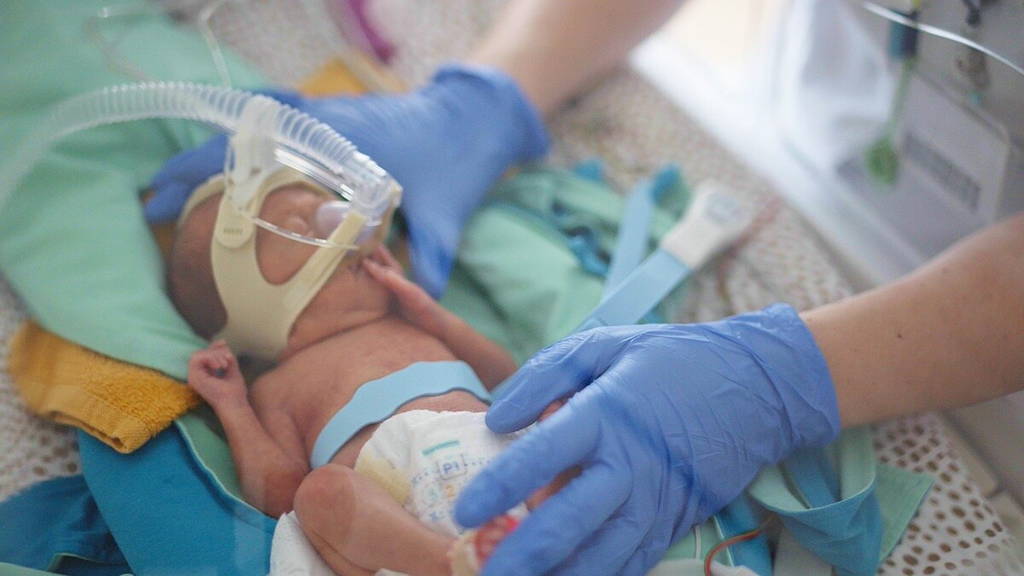Every year, millions of premature infants worldwide are placed in an incubator in the Neonatal Intensive Care Unit (NICU), where their vital signs must be continuously monitored. Traditionally, electrodes are applied to the tiny chests of babies for measuring heart rate and rhythm. With the introduction of the Bambi Belt, a silicone band equipped with various sensors and dEMG (electromyography) technology for apnea detection, these electrodes can be omitted, enabling wireless monitoring of essential vital signs.
The Bambi Belt monitors heart rate (ECG) and dEMG for apnea detection in premature infants using a silicone band placed beneath the baby's rib cage. The band transmits data to the patient monitor and the NICU alarm management system. This communication is facilitated through the Bambi Bridge, a device attached to the Belt and placed next to the baby in the incubator, along with the Bambi Monitor. This wireless solution is suitable for both regular ward and NICU settings.
The introduction of the Bambi Belt for premature infants offers another significant benefit. Since the baby's delicate skin no longer needs to be covered with wired sensors, the risk of injuries or allergic reactions is minimal. Additionally, with no cables connecting the baby to monitoring equipment, parents can occasionally hold their newborns. This not only holds emotional significance but also fosters positive parent-child bonding through skin-to-skin contact.
Pilot at MMC, AMC to Follow
The Bambi Belt for monitoring the vital functions of premature infants is currently undergoing a pilot phase at MMC. Over the next few months, a total of 50 babies will be monitored for 10 days using the Bambi Belt. "With this, we aim to investigate the added value of the Bambi Belt in healthcare. We know that the Bambi Belt can reliably measure heart activity and breathing pauses. Now, we are testing how it works in daily care for healthcare providers and parents," says Heidi van de Mortel, neonatology nurse, technology & innovation.
Bambi Medical is currently in discussions with several European hospitals interested in implementing the premature monitoring band. "Soon, a pilot will also commence at Amsterdam UMC, location AMC," says Fabio Bambang-Oetomo, CEO of Bambi Medical. "Several Swedish and German hospitals are also gearing up to start."
Over Thirteen Years of Development
The fact that Máxima MC (MMC) is the first hospital to adopt the Bambi Belt stems from the lengthy development process of medical devices. The Bambi Belt itself is not entirely new. This wireless monitoring system for premature infants' vital signs has been in development for many years. MMC has been aware of the band for quite some time; in January 2017, the hospital presented an earlier version of the Bambi Belt at the ICT&health Experience. It was still a prototype at that time.
The development of the Bambi Belt actually began in 2011 when Prof. Dr. Sidarto Bambang-Oetomo, the inventor of the belt, along with his students, developed a precursor to the Bambi Belt called the "smart jacket." About a year ago, Sidarto, with 35 years of experience in premature infant care, founded Bambi Medical with his son. Through various (European) grants, the technology has been further developed, resulting in the current version of the Bambi Belt.
Clinical Trials and CE Certification
Throughout the development of the Bambi Belt, various designs were considered, with some discarded, necessitating developers to return to the drawing board. This process is typical in the development of new, innovative products. "At the end of last year (2023), we received the important CE certification. That was the moment we could truly proceed with the Bambi Belt. Without this certification, medical devices cannot be brought to market," explains Bambang-Oetomo.
In late 2021, the Bambi Belt underwent successful testing in two clinical trials conducted at Amsterdam UMC and MMC. These trials compared the performance of wireless monitoring with traditional wired adhesive electrodes. Additionally, at MMC, the study assessed the positive impact of the Bambi Belt on the premature baby's skin condition compared to adhesive electrodes.
The reason MMC is the first to implement the Bambi Belt in practice is due to the hospital's early involvement in its development. Furthermore, Bambi Medical is a Dutch MedTech company. In a 2019 video, Fabio Bambang-Oetomo discusses the inception and early development of the Bambi Belt.






